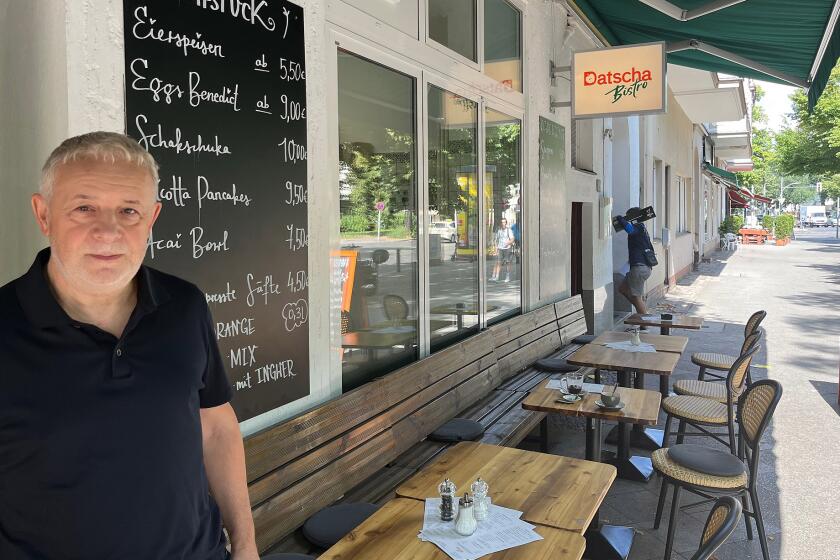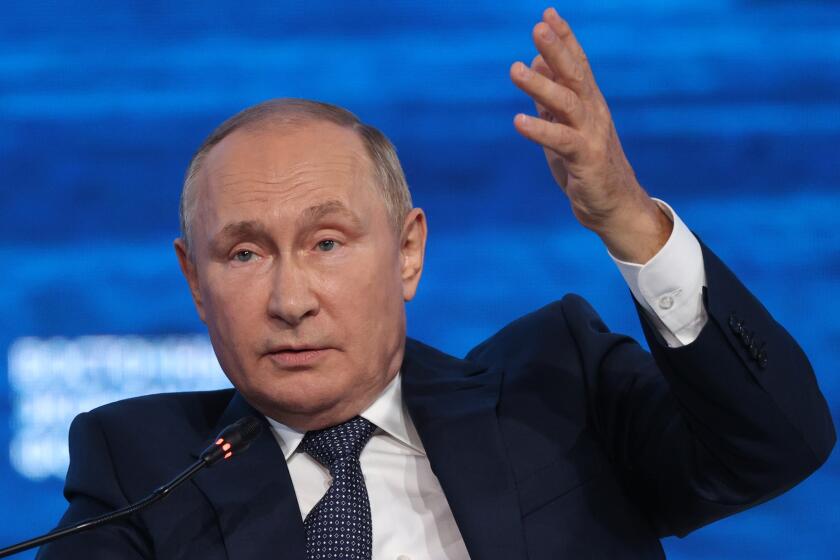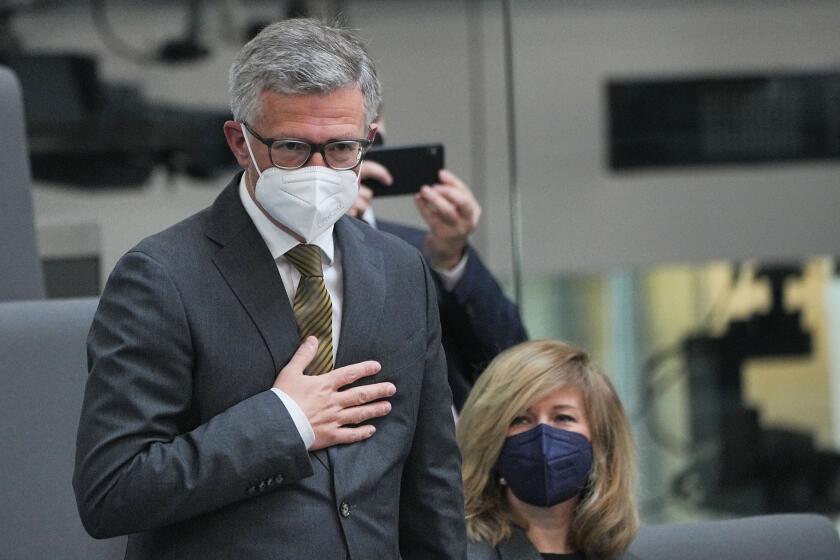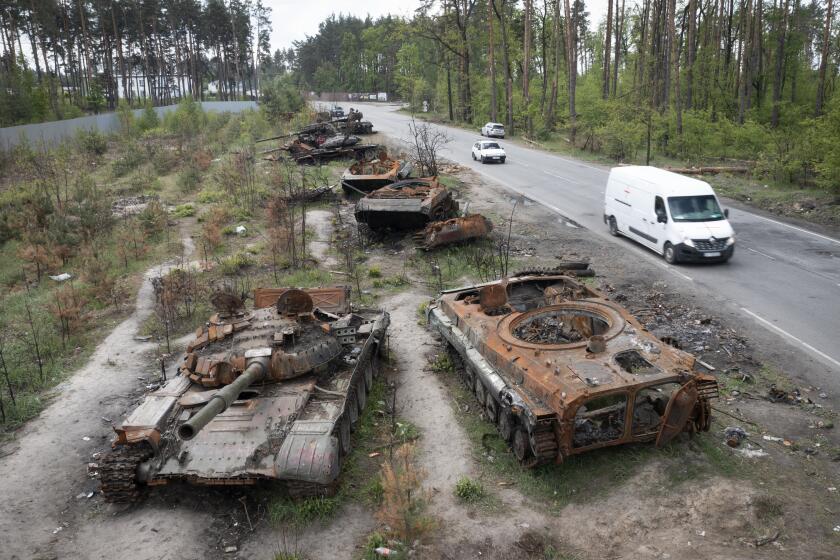Russia’s invasion of Ukraine is jolting Germany into rebuilding its military
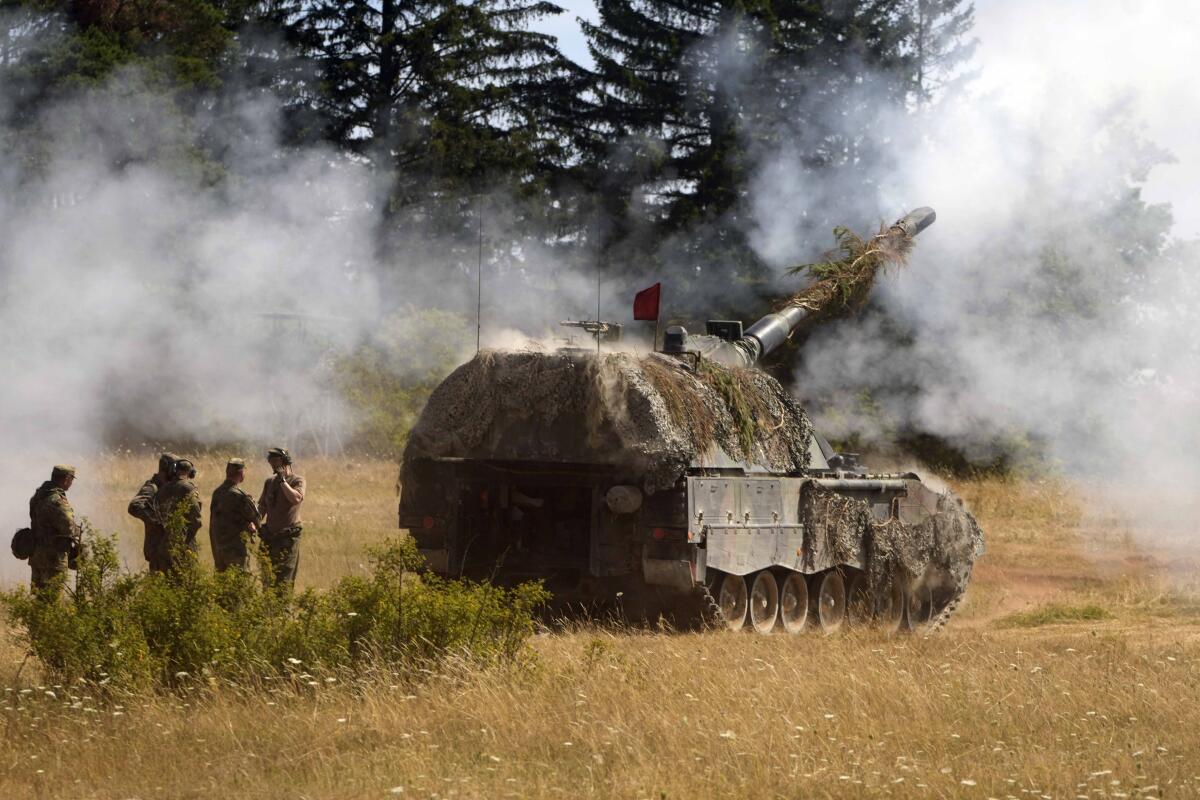
- Share via
BERLIN — In some ways, it was a perfectly ordinary conversation — a trio of bright, ambitious German high school kids thinking out loud about what they might do after graduation. But their discussion reflected a sea change in social attitudes: They were considering joining the military.
A decades-old aversion to serving in the German armed forces — the scourge of Europe during World War II, underfunded and neglected after the Cold War’s end — is swiftly reversing itself as a result of the war in Ukraine.
These three 18-year-olds, all of them set to finish high school next year in the northern town of Koethen, are coming of age just as Germany, Europe’s economic powerhouse, is aiming to rebuild and revitalize its military after generations of lingering Nazi-era stigma.
One of the students, Steven Foerster, said he was drawn to high-tech opportunities in the Bundeswehr, Germany’s federal defense forces. His classmate Sarah Naumann thought joining up might be a good way for her to pursue medical studies. Jakob Fischer, another student, said he could see himself serving in a combat unit.
“The negative image isn’t really there anymore,” said Foerster. Naumann concurred: “The German army has become attractive again.”
Despite Germany’s strong postwar tradition of pacifism, Russia’s full-scale invasion of Ukraine nearly seven months ago shocked the public into thinking very differently about national defense.
Germany is home to one of the world’s biggest Russian diaspora communities, but the Ukraine war has sparked incidents of ostracism and discrimination.
Three days after the war began, Chancellor Olaf Scholz — in office for less than three months — delivered a speech dubbed “Zeitenwende,” or watershed. With a single stroke, Germany embarked on the hitherto unthinkable: pledging to send heavy weapons to Ukraine and promising a $100-billion cash infusion for the military.
Those moves appear to have solid public backing. Polls suggest about two-thirds of Germans back the export of weapons to Ukraine and sanctions against Russia. The country has absorbed a flood of Ukrainian refugees. And according to a survey by the polling firm Civey, nearly a third of Germans say they have a better image of the Bundeswehr than before the Ukraine war.
In the not-so-distant past, the reputation of the Bundeswehr — the successor force to the infamous Nazi-era Wehrmacht — was less than stellar. Some members, especially conscripts, did their best to keep a low public profile. Few young people aspired to join. Starved of funds, shrunken in size, the military was almost invisible to the public.
“There was no pride in this army,” said Carlo Masala, a professor of international relations at Bundeswehr University in Munich.
Russian President Vladimir Putin says Moscow has resisted the ‘economic, financial and technological aggression’ of the West’s sanctions over Ukraine.
After the depredations of World War II, framers of the country’s postwar order initially envisioned Germany having no military at all. But a divided Germany was the Cold War’s ground zero for a tense standoff between the West and the members of the Warsaw Pact, led by the Soviet Union. At its height, the Bundeswehr belonged to the former West Germany and fielded almost half a million troops.
After the fall of the Berlin Wall and German reunification, though, troop strength was whittled down to 180,000, and modernization efforts stalled. The military draft remained in effect until 2011, but many young Germans sought to avoid conscription by applying to do some form of civilian service instead, such as working in a hospital.
“This distancing is part of our postwar culture,” Masala said.
At the same time, Germany’s security framework rested on the hope that engaging in vigorous trade with Russia would lead Moscow to eschew overt, large-scale aggression. The North Atlantic Treaty Organization’s Article 5, its foundational pledge, assures mutual assistance to all members in the event of an attack. That gave Germany a security umbrella but also fed complacency, analysts said.
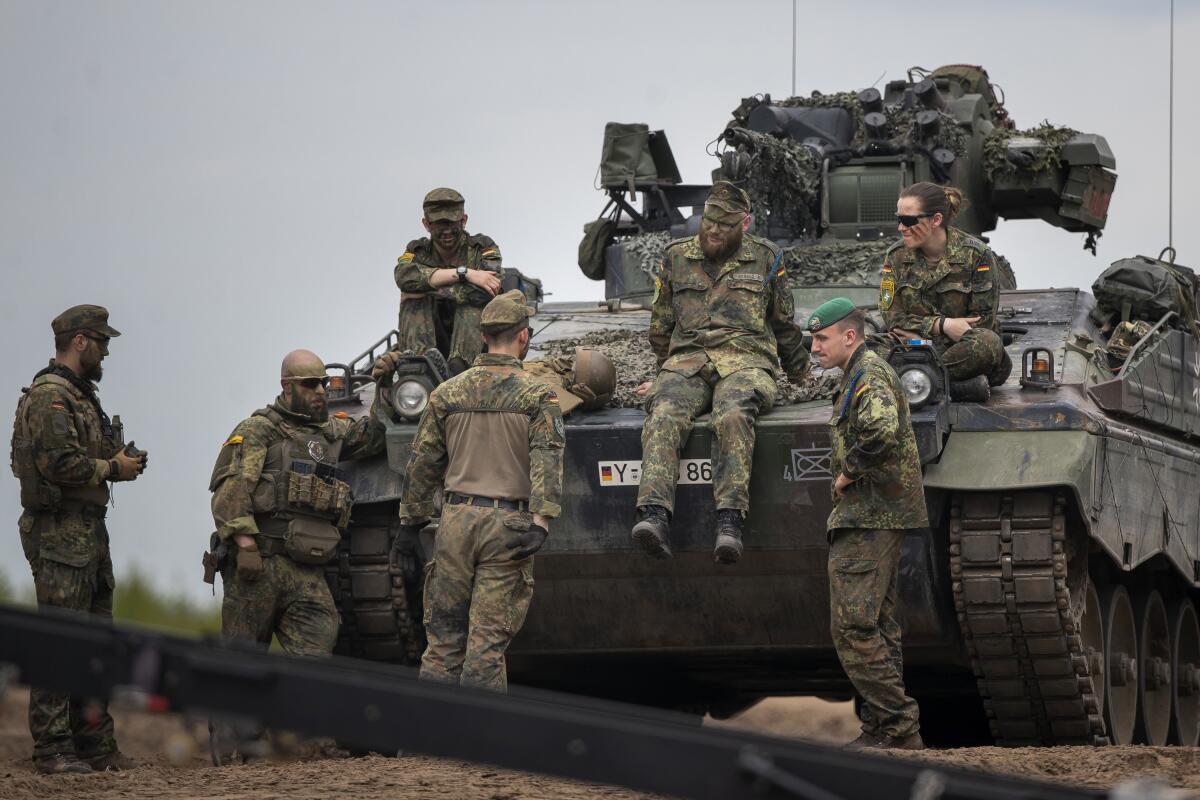
Russia’s invasion of Ukraine on Feb. 24 caught the German political and military establishment off guard, even as senior officials acknowledged that alarms had been blaring since Moscow’s 2014 illegal annexation of Ukraine’s Crimean peninsula.
The day after the war started, army chief Lt. Gen. Alfons Mais delivered a scathing verdict, calling the Bundeswehr “more or less bare.” Writing on the jobs platform and the social network LinkedIn, he declared: “We all saw it coming,” lamenting that Germany had failed to make needed preparations.
In January, a month before the invasion, a ministerial report on the readiness of the armed forces said only about three-quarters of the Bundeswehr’s main weapon systems were operational. Less than a third of its warships and only 40% of its helicopters were deemed “fully operational.” During the August 2021 evacuation mission in Kabul, in which Germany took part, only 10 of 30 transport aircraft were usable.
Masala recalled a major NATO exercise in Norway a few years ago, to which the Bundeswehr sent more than 5,000 soldiers but had to scrounge up basic supplies such as gloves from other units.
A Ukrainian ambassador, and others, makes Germans reflect on their relations with Russia
“This, of course, is an absurdity,” he said.
To a German public deeply shocked by events in Ukraine, the Bundeswehr — which has concerned itself mainly with foreign peacekeeping and natural disasters at home — is now seen as an indispensable guarantor of security, even though Western troops are not directly taking part in the Ukraine fighting.
Recruiters are seeking to capitalize on that more dynamic image. A new Bundeswehr video titled “We Protect Germany” features action-heavy scenes of fast-moving tanks and helicopter-borne troops swooping in to land.
Germany’s Green Party has been an intriguing barometer of changing sentiment. A heavyweight in the current coalition government and deeply rooted in the antiwar movements of the 1970s and 1980s, the left-leaning, environmental-minded party has probably made the most stunning U-turn in Germany’s recent political history, backing continued weapons shipments and a tough stance toward autocratic governments like those in Beijing and Moscow.
News Alerts
Get breaking news, investigations, analysis and more signature journalism from the Los Angeles Times in your inbox.
You may occasionally receive promotional content from the Los Angeles Times.
As the Ukraine war grinds on, Germany’s domestic issues are coming back to the fore: pensions, healthcare, jobs — and especially inflation, recession fears and the war-driven energy crunch.
But for now, public support for the military shows itself in ways large and small.
“Now people are asking us: What exactly is the Bundeswehr doing? What is driving you? How are you going to spend the 100 billion?” said army Capt. Frank Sperling, a youth liaison officer. “All of a sudden, there is interest again in what we do.”
Capt. Norman Sehmisch, another youth liaison officer, said there had been a jump in requests for military personnel to give public talks and visit schools.
A Russian paratrooper has self-published an explosive memoir about his experiences in Ukraine. But not everyone considers him a hero for doing so.
“Seventy-five percent of our lectures are now on Ukraine, on national defense,” he said. “Not about our missions abroad, in Mali, Kosovo, or when we were in Afghanistan.”
Even before the current Ukraine war, German service members in uniform could ride the train for free. But Sehmisch said interactions between uniformed troops and the public have taken on a different character these days.
“We get nods from fellow travelers, and the other day another passenger on the train even bought me a coffee,” he said. “The war in Ukraine makes people realize how important it is to have an army to protect them.”
Ziener is a special correspondent.
More to Read
Sign up for Essential California
The most important California stories and recommendations in your inbox every morning.
You may occasionally receive promotional content from the Los Angeles Times.
